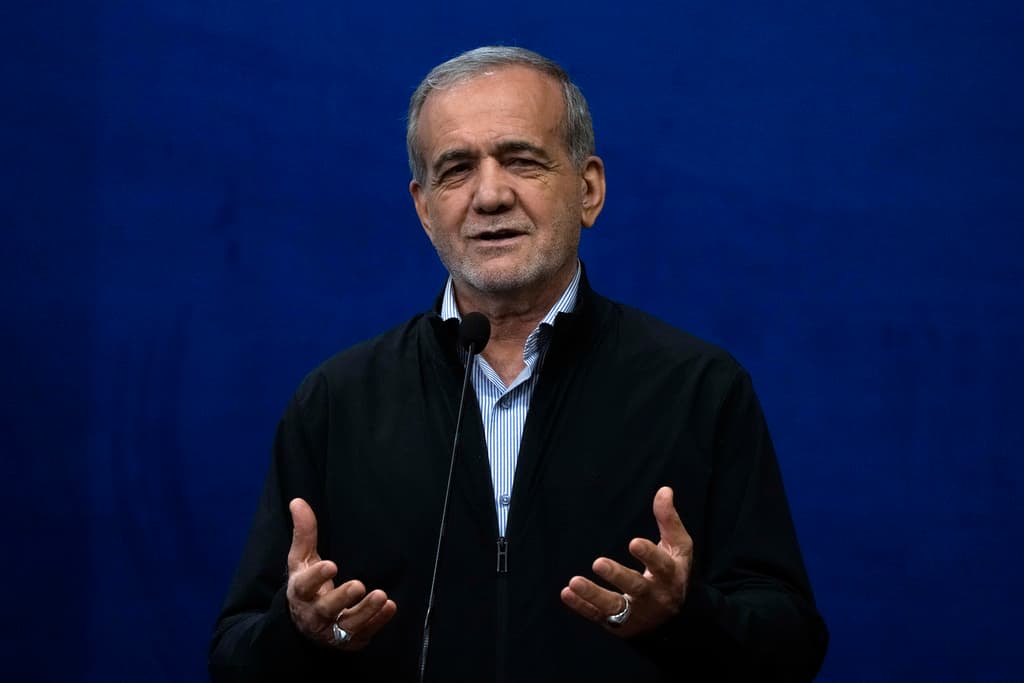Iran Seeking Further Sanctions Relief as Hopes for Regime Change Fade in the West
In meetings with European leaders during next week’s United Nations gathering, including President Macron of France, the newly installed Iranian president will try to revive diplomacy between the West and the Islamic Republic.

As Washington’s support for opponents of the Iranian regime fades away, President Pezeshkian is hoping to entice the West into renewed diplomacy that would ease pressures on the Islamic Republic.
The recently installed Iranian president is expected to land at New York over the weekend to attend next week’s United Nations gathering of world leaders. In meetings with European leaders, including President Macron of France, he will try to revive diplomacy between the West and Iran.
Mr. Pezeshkian’s New York trip coincides with this week’s second anniversary of the death of a 22-year-old Iranian, Mahsa Amini, who was killed after being arrested for improperly wearing the mandatory hair covering. Her death awakened a nationwide protest movement. Unlike past protests that demanded reforms, Iranians now are largely demanding regime change.
During the two-year uprising, 700 Iranians have been shot and killed. Some 22,000 protesters have been jailed, of which 1,400 were executed, according to a Brooklyn-based Iranian-American activist, Masih Alinejad. “This is how the regime silenced the protests,” she tells the Sun. “But the anger remains strong. People continue to reject the Islamic Republic.”
Yet the regime’s harsh measures are widely considered successful. The mostly young protesters, now under heavy surveillance, have gone underground, an Iran watcher at Tel Aviv’s Institute for National Security Studies, Beni Sabti, tells the Sun. “The people of Iran believe in the power of the West, and they need our support,” he says.
At this point, that support is weak at best. Washington officials issued pro-forma statements on the anniversary of Amini’s death this week, even as others are seeking to renew talks with the regime, citing Mr. Pezeshkian’s image as a moderate. Iran’s new foreign minister, Abbas Araghchi, and the president’s top adviser, Javad Zarif, led the Iranian team that negotiated the Iranian nuclear deal, the Joint Comprehensive Plan of Action.
Aware that a full return to that optimism-based 2015 deal is unlikely, an unidentified European diplomat instead tells Reuters, “I think we are looking for less for less: You do something on this and we do something on that. If talks resume it will be transactional and not transformational.”
An unidentified Iranian diplomat welcomed “the less for less idea, as the circumstances are far uglier than 2015.” Tehran seems to believe time is on its side: America is unlikely to do much before the next president’s January 20 inauguration, or soon afterward, while a new administration takes shape. Small Iranian concessions in that time could yield further sanctions relief.
Meanwhile, Iran is closer than ever to a breakout moment in its pursuit of a nuclear weapon. And it can look forward to the expiration of the “snap back” option at the UN Security Council. That option, a JCPOA component allowing for an undoing of the deal and the reinstatement of all global sanctions that existed prior to 2015, expires in October of next year.
For now, America’s Iran policy is in flux. The Department of State’s appeasers are dominant even following the suspension last year of the former Iran point man, Robert Malley. This week, the department’s inspector general reported that State mishandled Mr. Malley’s suspension. Even after he was accused of mishandling classified material, Mr. Malley continued to have access to it, and his advice was sought by senior department officials, according to the report.
“We see growing evidence of Iran collusion by members of the Biden-Harris Administration,” Senator Hagerty of Tennessee said in a statement, accusing administration officials of being “part of the Iranian regime’s malign influence network.”
A Pakistani man, Asif Merchant, pleaded not guilty this week at Brooklyn on a charge that he was hired by the Islamic Revolutionary Guards Corps to assassinate President Trump. In Israel, a local businessman was charged Thursday for allegedly plotting with Iran to assassinate Prime Minister Netanayhu and other top officials.
Also this week, the Iranian ambassador at Beirut, Mojtaba Amani, was injured, along with thousands of Hezbollah operatives who were maimed or killed, in a series of beeper explosions around the country. The injury to the ambassador, an IRGC member, exposed Iran’s intimate involvement in Hezbollah’s war activities.
Mr. Amani was flown back to Iran for treatment of a reported severe injury that left him at least partially blind. An image of his flight, during which he was accompanied by elite Hezbollah commanders, triggered anger in Iran. There, regime enforcers are seen as deliberately targeting protesters’ eyes, and then denying them medical treatment.
“Many women were shot in the face and deliberately blinded,” Ms. Alinejad says. Many Westerners favor negotiations with Tehran and consider the attempt to overthrow the regime a failure. Yet, the feminist who has long led the battle against forced Hijab rules predicts that the anti-regime movement will ultimately prevail.
“Revolutions throughout history sometimes take years,” Ms. Alinejad tells the Sun. “Changing the regime is a process that will take time, and each protest adds to the growing number of people dissatisfied with the regime. I strongly believe the next wave will be much stronger.”

